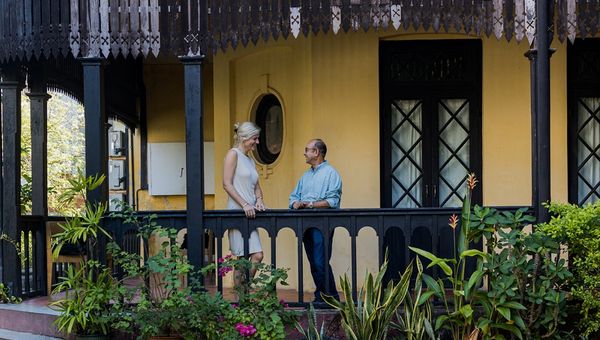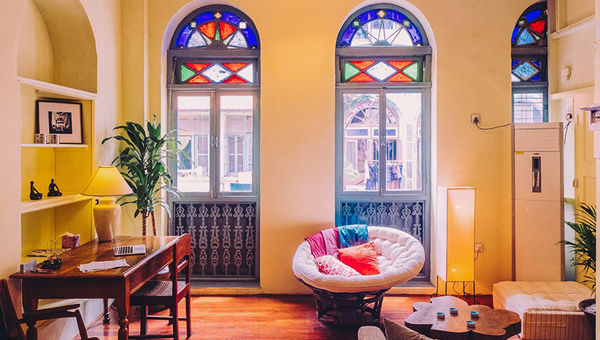It all started as personal interest projects for Emilie Roell who
embarked on small restorations and urban regeneration activities while
working in development cooperation with the European Commission, and
later with the United Nations in Myanmar in 2013.
“I was helping some Yangon families I had befriended to restore empty
parts of their homes and rent it out. I was struck by the incredible
heritage this city contains and how [only a] few historic building
owners were aware that they owned a treasure; that with a little support
they could unlock and benefit from it,” said the 34-year-old from the
Netherlands.
In time, Roell's work expanded as more families approached her,
resulting in the establishment of Heritage Homes, a platform featuring
historic properties in Myanmar, the Philippines and Georgia. Designed and launched by Doh Eain (“our
home” in Burmese), Heritage Homes is also a participatory design practice with 38
staff members dedicated to making cities better.

Emilie Roell with Gulam, a team member and one of the first homeowners whose apartment was restored by Doh Eain.
Creating livelihoods
One of Doh Eain’s earliest informal restoration involved a team
member’s apartment in a historical building on Bogalay Zay Street in
Yangon in 2015.
His family faced financial troubles when their mother fell ill. Doh
Eain helped with financial and design support, upgrading the apartment
to modern standards and renting it out to a new tenant. The renovation
cost was paid over time by the family, thanks to a solid monthly income.
This success drew other family members and friends who owned heritage
spaces to Doh Eain for restoration help.
Doh Eain focuses on financing restoration for heritage homeowners,
along with technical and project management services to help rent out
their properties, whereas Heritage Homes supports private homeowners to
look after their historic properties.
The aim is to contribute to cultural preservation as well as
environmental sustainability, family livelihoods and local economic
development.
While there is a lot of cultural heritage around Asia and other parts
of the world, some are publicly owned, with conservation efforts
typically concentrated on large public buildings or monuments. However, a
majority of historic buildings are in private hands.
“Many of the heritage homeowners, especially in lower-income
countries or low-income families, struggle to look after their
properties as they lack awareness, financial resources and technical
know-how,” Roell said.
Impactful travel for tour operators, DMCs
Many of the heritage homeowners, especially in lower-income countries or lower-income families, struggle to look after their properties as they lack awareness, financial resources and technical know-how.– Emilie Roell
Heritage Homes works as a membership model with a free and premium
paid tier for homeowners. Members can access Heritage Homes’ network and
resources such as technical guides, consultations with conservation
experts, listing management and marketing support, and financing. “We
also take a small commission on the bookings and rentals we help them
broker," said Roell.
It is divided into two categories: stay and rent. Under the stay
category, travellers can book online to stay for few or more days
whereas the rent category allows tenants to stay for one month or
longer. “Some homeowners offer their properties across both categories,
or switch between the two depending on the season," shared Roell.
Meanwhile, Heritage Homes also collaborates with tour operators,
destination management companies (DMCs) and digital nomad collectives so
that they can offer members’ properties to their clients or networks,
or work with them and their homeowners for further heritage experience.
It also wants to enable “impact travel” or “philanthropic
contributions”, where travel itineraries could include visits to ongoing
restorations or a house museum with tour proceeds used to support the
property.

Heritage Homes feature beautiful features that reflect the culture and architectural styles of the Philippines, Myanmar and Georgia.
Regional expansion
Since its establishment, Heritage Homes has grown beyond Myanmar,
working with homeowners in Georgia (Europe) and the Philippines, with
expansion planned in Southeast Asia, starting with Sri Lanka, Malaysia
and Thailand.
An additional category on places of interest and experience will be
introduced in the middle of 2023 as some members own properties such as
restaurants, shops or museums.
Currently, there are about 200 members across Georgia, Myanmar and
the Philippines, and a joint listing of nearly 700 rooms or homes,
dating back to the 1800s and early 1900s.
“The properties range from entire homes or apartments to one to two
rooms in a home that can be booked, or rooms in small heritage hotels.
When it comes to guesthouses or hotels, we like to focus on smaller
family run places, typically with 10 to 20 rooms,” Roell said.
In Sri Lanka, Malaysia and Thailand, hundreds of properties are being
eyed, given their incredible heritage. The plan is to lock in around
300 rooms or homes by the end of March.
Roell opined that their impact travel or philanthropy model is a good
way for tourism to contribute to preservation and to make tourism more
inclusive, particularly in countries like Sri Lanka, where, although
there is already strong heritage tourism, the homes are dominated by
wealthier companies and people. “With our work we hope to empower lower
income families to participate and benefit from heritage travel.”
As travel bounces back in Southeast Asia, Roell observed that
interest is rising in slower, more sustainable and immersive travel post
Covid. People want their travels to be meaningful and are keen on
leaving a positive impact on the places they visit.
“We believe our heritage homeowners have great places and experiences to offer, and we are here to help them be successful.”